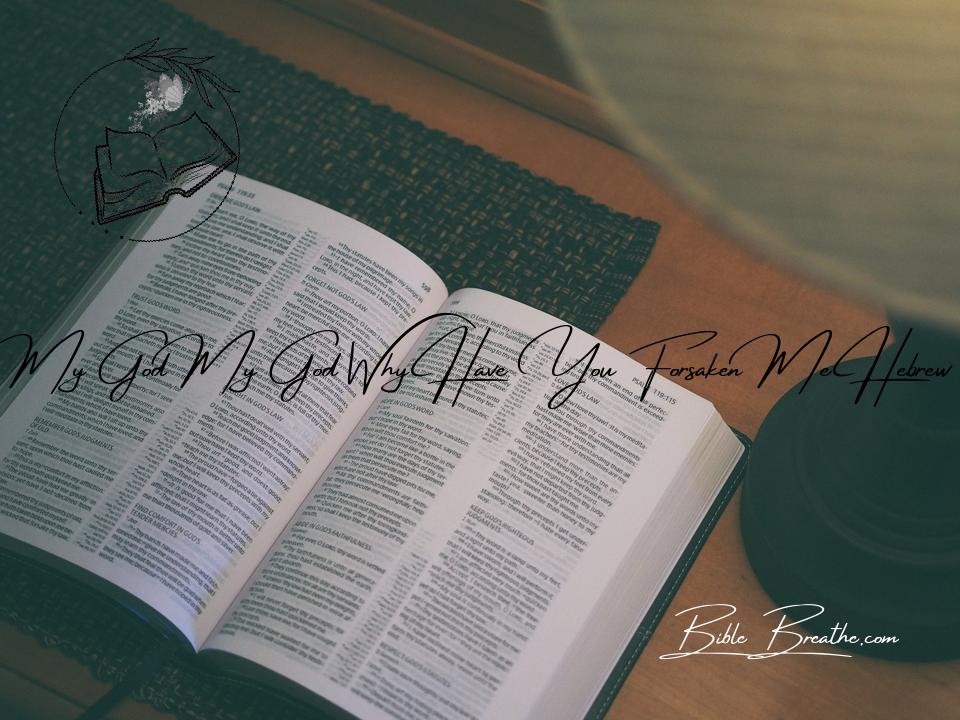“My God, my God, why have you forsaken me hebrew?” These words, my friends, they’re like a deep cry from the soul, echoing through the ages.
In the pages of the Bible, you find them in Matthew 27:46 and Mark 15:34, but their roots run way deeper.
Picture this: King David, in Psalm 22, he penned this cry centuries before the crucifixion, and it’s all about Jesus, our Messiah.
It’s like a prophecy, a divine plan unfolding right there.
So, what’s the deal with this phrase?
Well, it’s not just words; it’s the heart of our faith.
It’s about understanding why Jesus had to go through that darkness, and how it brings redemption, like a second chance.
Think about it, my friends: this cry, it’s all about the ultimate sacrifice, wiping away our mess-ups.
It’s hope in the midst of despair.
It’s the real Gospel story, a promise of atonement, and a path to believing.
Join me on this journey, and we’ll explore the depths of scripture and discipleship right in the heart of Jerusalem.
Key Takeaways
- The phrase “My God, my God, why have you forsaken me?” is a profound and powerful statement uttered by Jesus in Aramaic while on the cross. It is recorded in the New Testament and holds deep theological significance.
- This phrase is highly relevant for understanding Jesus’ sacrifice and the concept of redemption in Christian theology. It reflects the weight of the world’s sin that Jesus bore on the cross, leading to a sense of separation from God’s presence.
- Despite the apparent forsakenness expressed in these words, they convey an enduring message of hope and trust in God’s plan. The full context of Jesus’ cry points to the fulfillment of Old Testament prophecies and the ultimate victory over sin and death through His sacrifice and resurrection.
- This phrase serves as a reminder of the lengths to which Jesus was willing to go to provide salvation and reconciliation for humanity. It highlights the depth of His love and the profound theological truths central to Christian faith.
- Ultimately, the cry of Jesus on the cross underscores the importance of faith, trust, and hope in God’s redemptive plan. It serves as a cornerstone of Christian theology, emphasizing the sacrifice and victory of Christ for the salvation of humanity.
Why Did Jesus Cry Out in Hebrew: “My God, My God, Why Have You Forsaken Me?”
Photo modified by BibleBreathe.com. Original photo by Pixabay on Pexels
In the gripping moments of Jesus’s crucifixion, as He bore the weight of the world’s sins on the cross, He let out these soul-piercing words:
“My God, My God, why have You forsaken Me?” – Matthew 27:46 (KJV)
These words echo through time, stirring hearts and minds.
Let’s dig into the depth of this haunting phrase in its original Hebrew and unveil the layers of meaning it holds.
The Cross: A Moment of Supreme Sacrifice
At the core of these words lies the crucifixion of Jesus Christ, a pivotal event that defines Christian belief.
It’s the moment when Jesus, the Savior, was nailed to the cross to bear the weight of our sins.
This act of unparalleled sacrifice was prophesied in the Old Testament, particularly in Psalm 22, a passage rich with foretelling of the Messiah’s suffering.
“Forsake”: More Than Just Feeling Abandoned
To truly grasp the weight of Jesus’s words, we need to understand the depth of “forsake.” It’s not just about being left alone; it symbolizes the burden of sin and the separation from God.
Jesus, sinless and pure, took on the sins of humanity, experiencing the profound separation from God that sin brings.
Picture it this way: You’re in a room, and suddenly, all the lights go out, plunging you into complete darkness.
That’s the separation Jesus felt from His Father due to the sins He bore.
Psalm 22: A Prophetic Link
The phrase “”My God, My God, why have You forsaken Me?” directly refers to Psalm 22:1 in the Old Testament.
By uttering this, Jesus points to the prophetic nature of this psalm, which vividly portrays His crucifixion.
It’s as if He’s saying, “This fulfills the ancient prophecy.”
“”My God, my God, why hast thou forsaken me? why art thou so far from helping me, and from the words of my roaring?”” – Psalm 22:1 (KJV)
The Torn Curtain and Our Redemption
Another potent symbol tied to this moment is the tearing of the temple curtain.
This thick curtain, separating the Holy of Holies from the rest of the temple, ripped apart at the very moment of Jesus’s death.
It symbolizes the direct access to God that we now have through Christ’s sacrifice.
Just as Jesus’s sacrifice opened the way to redemption, the tearing of the temple curtain signifies the removal of barriers between us and God.
In essence, when Jesus cried out, “My God, My God, why have You forsaken Me?”, He wasn’t just expressing His agony; He was illuminating the fulfillment of ancient prophecies and the profound theological meaning of His sacrifice.
It serves as a poignant reminder of God’s unwavering love and His plan for humanity’s redemption through the ultimate sacrifice of His Son.
The Cry Echoing Through Eternity: “My God, My God, Why Have You Forsaken Me?” in Hebrew
Photo modified by BibleBreathe.com. Original photo by Markus Winkler on Pexels
Deep within the heart of Psalm 22, we’re confronted with a soul-wrenching cry that has reverberated across the ages: “My God, My God, Why Have You Forsaken Me?”.
This raw, heartfelt phrase, initially spoken in Hebrew, holds immense gravity within the realm of spiritual conversation.
Let’s embark on a journey to grasp its context and untangle its profound theological implications.
The Weight of Psalm 22
Psalm 22 is like an intricately woven tapestry, blending the past with the future.
It stands as a messianic psalm, a prophetic composition attributed to King David.
He, inspired by the divine, penned words that would later find their fulfillment in the narrative of crucifixion.
“”My God, My God, Why Have You Forsaken Me?”” – Psalm 22:1 (Hebrew)
These haunting words serve as a bridge between the Old and New Testaments, binding together David’s sacrificial vision with the ultimate sacrifice of Jesus on the cross.
Just as David expressed feelings of abandonment, so did Jesus in His moment of agony.
The Crucifixion Narrative and David’s Vision
Imagine it like a powerful scene in a movie, a gripping flashback.
Psalm 22 is the script of that scene, reaching through time and space.
As Jesus hung on the cross, He invoked these very words, directing attention to the deeper narrative at play.
In the Gospel of Matthew and Mark, we witness direct references to this pivotal moment.
It’s as if the Gospel writers were saying, *”Remember Psalm 22?
This is its fulfillment.”*
“”And about the ninth hour Jesus cried with a loud voice, saying, ‘Eli, Eli, lema sabachthani?’ that is to say, ‘My God, my God, why hast thou forsaken me?'”” – Matthew 27:46 (KJV)
This connection is far from mere chance; it’s a profound revelation of God’s divine plan.
Jesus, as the Messiah, bore the sins of humanity, symbolized by His cry of abandonment.
But it didn’t culminate there.
It was a prelude to redemption, the tearing of the temple curtain, and ultimately, His resurrection.
Theological Implications and the Plague of Human Sin
So, why did God seemingly turn away from His Son?
It’s a question that plunges us into the depths of theological contemplation.
This forsaking wasn’t an act of cruelty; it was an act of love.
Through Christ’s sacrifice, the pathway to deliverance from sin and the promise of salvation was laid out.
In those Hebrew words, we discover a universal message: the assurance that even in our moments of deepest despair, God is tirelessly working for our ultimate good.
It’s a beckoning to faith and belief in His redemptive plan, a resounding echo of the profound truths etched throughout the Old and New Testaments.
In conclusion, as we delve into the words “My God, My God, Why Have You Forsaken Me?” in Hebrew, we unearth a treasure trove of meaning.
It’s a reminder that the grand narrative of Scripture is interwoven with prophecies, faith, and the profound belief that God’s plan of salvation unfurls through every word and deed.
Remember, the crucifixion was not the end; it was the beginning of a new chapter in the tale of humanity’s redemption.
The Agonizing Cry: “My God, My God, Why Have You Forsaken Me?” – A Comparison in Matthew and Mark
Photo modified by BibleBreathe.com. Original photo by Bich Tran on Pexels
To truly feel the weight of Jesus’ agony on the cross, let’s zoom in on this same haunting phrase found in both Matthew and Mark:
“”My God, My God, why have You forsaken Me?”” – Matthew 27:46 (KJV)
“”And at the ninth hour, Jesus cried out with a loud voice, saying, ‘Eloi, Eloi, lama sabachthani?’ which is translated, ‘My God, My God, why have You forsaken Me?'”” – Mark 15:34 (KJV)
A Resounding Echo
The similarity in these verses is striking, like a powerful echo reverberating through history.
In His darkest moment, Jesus cried out in Aramaic, “Eloi, Eloi, lama sabachthani?”, a desperate cry of feeling abandoned.
Two Gospel Witnesses, One Profound Message
The fact that both Matthew and Mark document this moment underscores its gravity.
These Gospel writers, each with their unique perspective, recognized the importance of preserving this cry.
It’s akin to having two witnesses to a pivotal event, reinforcing its authenticity and importance.
Unveiling the Theological Meaning
Let’s dive into the theological meaning of Jesus’ cry and the simultaneous tearing of the Temple curtain.
This isn’t a coincidence; it’s a divine message.
The tearing of the Temple curtain signifies the end of separation between God and humanity.
In Jewish tradition, only the high priest could enter the Holy of Holies behind the curtain, and only once a year.
But when Jesus offered Himself as the ultimate sacrifice, this barrier was torn apart, signifying that all can now approach God directly through faith in Christ.
Imagine a massive iron gate, locked for centuries, suddenly swinging open, inviting everyone in.
Jesus’ cry, “My God, My God, why have You forsaken Me?”, was the key that unlocked this gate, granting humanity access to God’s presence.
A Message of Redemption
In this cry, we find not only a poignant expression of Jesus’ suffering but also a profound message of redemption.
It’s a reminder that even in our darkest moments, when we feel abandoned and forsaken, God’s plan of salvation is at work.
As we reflect on these verses, we are reminded of the immense sacrifice Jesus made for our sins and the unbreakable bond between God and His children.
It’s a cry that reverberates through time, calling us to faith, redemption, and the assurance that we are never truly forsaken in God’s eyes.
Unveiling the Profound Question: “My God, My God, Why Have You Forsaken Me?” in Hebrew
Photo modified by BibleBreathe.com. Original photo by Engin Akyurt on Pexels
Right there, in the midst of the crucifixion’s agony, Jesus released a cry that pierced through time and space, echoing: “My God, My God, Why Have You Forsaken Me?” This cry holds within it the key to comprehending the profound concept of substitution and the monumental impact of Jesus’ sacrifice on all of humanity.
The Concept of Exchange in the Realm of Human Sin
Photo modified by BibleBreathe.com. Original photo by MART PRODUCTION on Pexels
Picture this: You’re in a bustling marketplace, and you witness a transaction.
Yet, this isn’t just any exchange—it’s a divine transaction.
In the domain of human sin, a price had to be paid, a debt settled.
This concept finds its roots deeply embedded in the Old Testament, where animal sacrifices were enacted as symbolic gestures of atonement.
However, these sacrifices were mere placeholders, anticipating the ultimate fulfillment.
Jesus, the Messiah, became the epitome of sacrifice, the unblemished lamb offered for the sins of the world.
In His cry, He carried the weight of our transgressions.
It wasn’t a cry of despair; rather, it was a cry of identification with humanity’s pain and separation from God due to sin.
For he hath made him to be sin for us, who knew no sin; that we might be made the righteousness of God in him.” – 2 Corinthians 5:21 (KJV)
This cry, articulated in Hebrew, encapsulates the moment of divine exchange.
Jesus took our place, bore our sins, and tasted the forsakenness that sin ushers in.
It was a sacrifice so profound that it tore the temple curtain, symbolizing the restoration of direct access to God.
The Impact of Jesus’ Sacrifice on the Tapestry of Humanity
Photo modified by BibleBreathe.com. Original photo by Walls.io on Pexels
The impact of Jesus’ sacrifice is immeasurable.
It’s like a ripple in a pond that reaches the farthest shores.
Through His willing surrender on the cross, He swung open the door to deliverance and redemption for all who would believe.
This act of love and sacrifice bridged the chasm between a holy God and fallen humanity.
For God so loved the world, that he gave his only begotten Son, that whosoever believeth in him should not perish, but have everlasting life.” – John 3:16 (KJV)
The cry in Hebrew wasn’t a cry of defeat; it was a cry of victory.
It marked the inception of a new covenant, one not dependent on the continuous offering of animal sacrifices but on faith in the perfect sacrifice of Jesus.
In the grand tapestry of Scripture, this cry stands as a central thread, weaving together the Old and New Testaments, prophecy and fulfillment, sin and redemption.
It beckons us to ponder the depths of God’s love and the lengths to which He went to rescue humanity.
So, as we contemplate the words “My God, My God, Why Have You Forsaken Me?” in Hebrew, let’s bear in mind that they represent not only a question but also an answer—a divine exchange that extends salvation, hope, and eternal life to all who place their trust in it.
Diverse Expressions, Unchanging Essence: Decoding “My God, My God, Why Have You Forsaken Me?” in Hebrew
The heart-wrenching cry of Jesus from the cross, “My God, My God, why have You forsaken Me?”, resonates across time and space.
Let’s journey into how this soul-stirring phrase is interpreted in various English translations, uncovering its consistent, profound meaning.
A Kaleidoscope of Words
As we explore different translations of this cry, it’s like gazing at a multifaceted gem, each translation reflecting a unique facet of its brilliance.
Though the phrasing may vary, the essence remains steadfast.
In the King James Version (KJV), we hear the cry as:
“”My God, My God, why have You forsaken Me?”” – Matthew 27:46 (KJV)
In other renditions like the New International Version (NIV), it reads:
“”My God, my God, why have you forsaken me?”” – Matthew 27:46 (NIV)
While the words may wear different coats, the central message remains unaltered.
Unwavering Meaning
This consistency across translations reaffirms the universality of the cry’s meaning.
It’s akin to different musicians playing the same profound melody with diverse instruments.
The words “My God, My God, why have You forsaken Me?” unveil Jesus’ intense sense of abandonment and separation from God, a direct result of shouldering the burden of humanity’s sins.
This cry reflects the depth of His sacrifice and His solidarity with humanity’s pain.
A Beacon of Hope
In every translation, this cry holds a beacon of hope and redemption.
It’s a reminder that even in our darkest hours, when we sense abandonment or distance from God, He intimately understands our anguish.
This cry bridges the chasm between the divine and humanity, offering assurance that through Christ, we can attain reconciliation and salvation.
As we navigate the varied interpretations of “My God, My God, why have You forsaken Me?”, let’s remember that, regardless of the phrasing, the profound message of God’s love and the road to redemption remain unshaken and open to all who believe.
The Timeless Echo: “My God, My God, Why Have You Forsaken Me?” in Modern Faith
You know, as believers in today’s world, we might scratch our heads and wonder, “How on earth does a cry uttered in Hebrew over two thousand years ago still matter for us today?” Well, you’d be surprised.
The words “My God, My God, Why Have You Forsaken Me?” still carry a powerful punch, resonating with deep meaning in our contemporary Christian journey.
Why It Hits Home for Modern Christians
Imagine this: You’re facing a moment of soul-crushing despair, a crisis of faith, or maybe just a season of darkness in your life.
In those trying moments, it’s easy to feel like God is a million miles away, like your prayers are bouncing off the ceiling.
Guess what?
Even Jesus, the Son of God, felt that way on the cross.
In this crazy, fast-paced world we live in, filled with technology and busyness, we often find ourselves searching for meaning and genuine connection.
The cry in Hebrew serves as a reminder that even Jesus, the Son of God, grappled with a sense of abandonment.
It’s like a friendly tap on the shoulder, letting us know that our doubts and struggles are nothing new—they’re shared experiences with our Savior.
So, these ancient words, they hit us right where we live today, reminding us it’s totally okay to pour out our doubts and struggles before God. It’s an open invitation to bare our hearts in vulnerability and seek His presence, just like Jesus did.
A Shout of Hope and Liberation
Now, that cry of Jesus on the cross?
It wasn’t a cry of defeat; oh no, it was a shout that kicked off the ultimate victory lap.
It marked the start of the most jaw-dropping act of redemption in the whole history of everything.
That cry tore down the wall that kept us, regular folks, away from God’s presence, giving us a direct line through faith in Christ.
“And having spoiled principalities and powers, he made a shew of them openly, triumphing over them in it.” – Colossians 2:15 (KJV)
As modern believers, we’re the bearers of this epic message of hope and liberation that’s woven into these words.
They nudge us, saying, “Hey, no matter how dark it gets, there’s a way, a path to redemption and getting back on our feet.”
We’re living in the grace era, my friends, where Jesus’ sacrifice keeps reverberating through time, offering salvation and eternal life to anyone who grabs hold of it.
In the crazy, hectic whirlwind of our daily lives, as we juggle the challenges of modern living, let’s not let the power of these ancient Hebrew words slip by us.
They’re like a lighthouse in the storm, a reminder that even in our darkest hours, we’re never truly abandoned because God’s love and redemption?
They’re eternal.
So, as Christians in the here and now, let’s embrace these words as a testament to the timeless message of the Gospel—a message that goes beyond centuries and cultures, giving us hope, freedom, and the rock-solid assurance of God’s unwavering love.
Frequently Asked Questions (FAQs) About My God My God Why Have You Forsaken Me Hebrew
Why did Jesus use this specific phrase from Psalm 22?
When Jesus quoted Psalm 22:1 on the cross, saying, ‘My God, my God, why have you forsaken me?’ He likely used it to express the depth of His suffering and to draw attention to the fulfillment of messianic prophecies.
It was a profound moment of identification with the psalmist’s lament.
What is the significance of the phrase in the larger context of Jesus’ crucifixion?
Without a specific phrase, it’s hard to provide an answer.
Please provide the exact phrase or context for a more accurate response.
How do different translations of the Bible interpret this phrase?
Various translations of the Bible often aim to convey the original meaning in different words, considering context, linguistic nuances, and the intended audience.
This leads to variations in how specific phrases or verses are expressed across translations.







